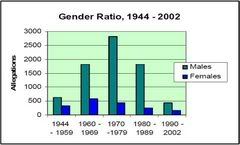The long-awaited apostolic visitation of American seminaries and other houses of clerical formation is gearing up and coming soon. Given the hugely damaging sex-abuse scandal—so damaging partly because so assiduously publicized, unlike similar problems in public-school systems and other spheres—it is certainly needed. But as Diogenes over at Off the Record suggests, there seem to be as many Church professionals who hope it won't work as hope it will. More even than the scandal itself, that explains why the visitation is so necessary.
With not a little dismay, I have written before about the apparently inability of the American bishops as a whole to attack the roots of the dispiriting problems confronting the Church in this country. One of those roots is the self-serving unwillingness of many to even admit what one of the roots is: homosexuals in the priesthood. Progressives have no problem repeating that the inexcusable coverup and belittling of so many sex-abuse cases was self-serving on the part of the offending bishops, who were more interested in covering their own and the Church's posterior than in protecting the young. Yet it has become all too apparent that, in some cases, the problem is that bishops were either homosexuals themselves or otherwise more inclined to sympathize with homosexual priests than to rein them in. Speaking as a former seminary adjunct professor as well as a former victim, I can state unequivocally that the intellectual and social tone of many seminaries during the 60s, 70s, and early 80s contributed to that problem as much as it reflected it.
One symptom thereof is the fact that, in the last several years, half-a-dozen American bishops have been forced to resign on account of their own sexual improprieties. Four of them committed homosexual improprieties—none of which were with pre-pubescent children. But many Church types like to deflect attention from the fact thereby illustrated: the majority of sex offenses committed by clerics were not cases of pedophilia, i.e. sex with pre-pubescent children, but of ephebophilia, i.e. sex with adolescents. Most of those adolescents have been boys. The National Review Board's report (PDF; 4.9 MB) shows as much literally graphically:
Of course pedophilia is a horrible crime and should be most vigorously prevented. I can't blame most people for focusing on that. But not even most homosexual priests are pedophiles; and by focusing on the pedophilia problem, the bishops are addressing only one symptom of the larger problem rather than its main cause. That permits them to continue skirting the formation issue of admitting homosexuals to the seminary and allowing them to form circles of mutual sympathy even when many do not actually violate celibacy. That's just the sort of clubbiness we can no longer afford. Some, such as Archbishops Chaput of Denver, George of Chicago, and Burke of St. Louis have admirably come to grips with the larger issue. But many more have not. And that's the negligence which the apostolic visitation needs to focus, laser-like, on addressing.
With not a little dismay, I have written before about the apparently inability of the American bishops as a whole to attack the roots of the dispiriting problems confronting the Church in this country. One of those roots is the self-serving unwillingness of many to even admit what one of the roots is: homosexuals in the priesthood. Progressives have no problem repeating that the inexcusable coverup and belittling of so many sex-abuse cases was self-serving on the part of the offending bishops, who were more interested in covering their own and the Church's posterior than in protecting the young. Yet it has become all too apparent that, in some cases, the problem is that bishops were either homosexuals themselves or otherwise more inclined to sympathize with homosexual priests than to rein them in. Speaking as a former seminary adjunct professor as well as a former victim, I can state unequivocally that the intellectual and social tone of many seminaries during the 60s, 70s, and early 80s contributed to that problem as much as it reflected it.
One symptom thereof is the fact that, in the last several years, half-a-dozen American bishops have been forced to resign on account of their own sexual improprieties. Four of them committed homosexual improprieties—none of which were with pre-pubescent children. But many Church types like to deflect attention from the fact thereby illustrated: the majority of sex offenses committed by clerics were not cases of pedophilia, i.e. sex with pre-pubescent children, but of ephebophilia, i.e. sex with adolescents. Most of those adolescents have been boys. The National Review Board's report (PDF; 4.9 MB) shows as much literally graphically:

Of course pedophilia is a horrible crime and should be most vigorously prevented. I can't blame most people for focusing on that. But not even most homosexual priests are pedophiles; and by focusing on the pedophilia problem, the bishops are addressing only one symptom of the larger problem rather than its main cause. That permits them to continue skirting the formation issue of admitting homosexuals to the seminary and allowing them to form circles of mutual sympathy even when many do not actually violate celibacy. That's just the sort of clubbiness we can no longer afford. Some, such as Archbishops Chaput of Denver, George of Chicago, and Burke of St. Louis have admirably come to grips with the larger issue. But many more have not. And that's the negligence which the apostolic visitation needs to focus, laser-like, on addressing.
Like the last one actually was, this one threatens to become just another bureaucratic charade. The visitees will put on their best faces; curricula, procedures, and numbers will be reviewed; seminary faculty and rectors will enjoy some fine meals with Vatican bigwigs. But will the unvarnished facts be made clear, discussed frankly, and acted on effectively? I hope so, and there's more reason for hope now than in the past. But let the passive resistance not be underestimated.



























